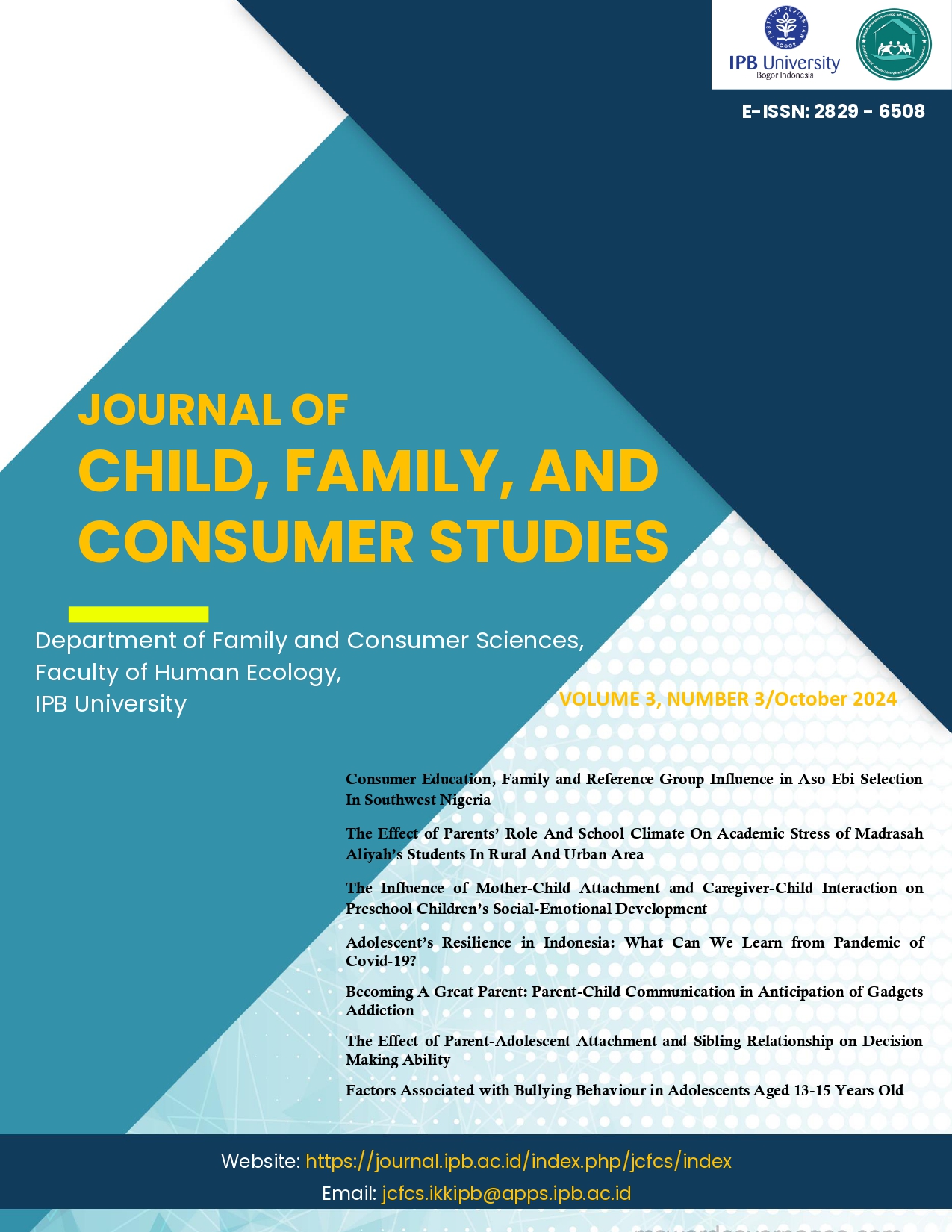CONSUMER EDUCATION, FAMILY AND REFERENCE GROUP INFLUENCE IN ASO EBI SELECTION IN SOUTHWEST NIGERIA
Abstract
In Nigeria, the selection of aso ebi, a traditional attire worn for special occasions, is influenced by various social and familial factors. This study examined the relationship between family influence, reference group influence, and consumer education in the selection of aso ebi in Southwest Nigeria. Two research questions were posed, and two hypotheses were tested at a 0.05 level of significance. A correlational design was employed to collect data from 1200 adult individuals (aged 18 years and above) in the Southwestern geopolitical zone of Nigeria, covering Ekiti, Lagos, Ogun, Ondo, Osun, and Oyo states. A validated, reliable, self-structured questionnaire titled "Consumer Education and Behaviour in the Choice of Aso Ebi Questionnaire (CEBCAQ)" was used for data collection. Data analysis was conducted using Pearson’s r and Fisher's Z statistics. Findings revealed a positive but low correlation between consumer education and both family (r = 0.10) and reference group purchasing behaviour (r = 0.14) in aso ebi selection. The relationship between consumer education and consumer behaviour was significantly stronger among male adults than female adults (rmales = 0.62, rfemales = 0.49, Zcal > Ztab); and significantly stronger among older adults than younger adults (rold =0.59, ryoung = 0.48, Zcal > Ztab). The study concludes that the complex interplay of social pressure, family dynamics, reference groups, and economic factors influencing aso ebi choices aligns with consumer behaviour surrounding clothing articles globally. Future research could explore how consumer education programs may be tailored to target families and address social influences in aso ebi selection.
References
Adeyanju F.B. & Kolawole A. A. (2019). Consumer education (HED123). [Unpublished Course Material, National Open University of Nigeria]. https://www.nou.edu.ng/sites/default/files/2020-08/HED%20123%20 CONSUMER%20HEALTH%20EDUCATION%20COURSE%20MODULE.pdf
American Public Health Association (APHA) (2013). Consumer education resources for public health practitioners. The Affordable Care Act’s Health Insurance Marketplace. Retrieved from https://www.apha.org/~/media/files/pdf/topics/aca/aca_resource_ guide_103013.ashx
Burnett, J. (2021). Introducing Marketing. DropBoxUser. Retrieved from https://dl.dropboxusercontent.com/ u/31779972/Introducing%20Marketing.pdf
Chiwendu, O.D. & Shedrack, M.C. (2018). Investigating the influence of social class on consumers’ shopping behaviour in Nigeria. International Journal of Marketing Research Innovation, 2(2), 38-48.
Ciasullo, M. V., Maione, G., Torre, G. & Troisi, O. (2017). What about Sustainability? An Empirical Analysis of Consumers’ Purchasing Behaviour in Fashion Context. Sustainability, 9 (1617). Retrieved from http://doi.org/10.3390/su9091617
Clootrack (2021). Major factors influencing consumer behaviour. Retrieved from https://clootrack.com/knowledge_base/major-factors-influencing-consumer-behaviour/
DDL Resources (2021). Boundless Marketing. Retrieved from https://ddl-resources.s3-ap-southeast-1.amazonaws.com/resources/boundless-marketing.pdf
Dreyer, H., Botha, E., Neoline le Roux, D-M. & Ellis, S. (2016). Consumers’ understanding and use of textile eco-labels during pre-purchase decision making. Journal of Family Ecology and Consumer Sciences, Special Edition Diversifying clothing research in Southern Africa, 1:1-19
Good, M. A. (2000). Secondary school family and consumer sciences teachers' perceived importance of family and consumer sciences competencies. Retrospective Theses and Dissertations. 13902. Retrieved from https://lib.dr.iastate.edu/rtd/13902
Koca, E., & Koc, F. (2016). A Study of Clothing Purchasing Behaviour By Gender with Respect to Fashion and Brand Awareness. European Scientific Journal, 12(7), 234. Retrieved from http://dx.doi.org/10.19044/esj.2016.v12n7p234
Meena, S. (2018). Consumer psychology and marketing. International Journal of Research and Analytical Reviews (IJRAR), 5(3): 218-222. ISSN 2348-1269
Oshio, L. E. & Ihensekhien, I. (2019). Effect of consumer education on consumer skills of adolescents in senior secondary schools in Nigeria: Implication for national peace and security.International Journal of Educational Policy Research and Review, 6 (2): 39-45. Retrieved from https://doi.org/10.15739/IJEPRR.19.006
Saanvivmd (2021). What is consumer education? Brainly. Retrieved from https://brainly.in/question/ 35730708
Shen, D., Richards, J., & Liu, F. (2013). Consumers’ awareness of sustainable fashion. Marketing Management Journal, 23(2), 134-147
Shu’ara, J. (2022). Influence of Consumer Education on Entrepreneurial Innovations in Nigeria. International Journal of Academia, 6(1): 41-55. Retrieved from https://www.researchgate.net/publication/344403353
Solomon, M. R. (2017). Consumer behaviour: Buying, having, and being (12th ed.). Pearson.
Tajuddin, F. N. (2019). Cultural and social identity in clothing matters: Different cultures, different meanings. European Journal of Behavioural Sciences, 1(4):21-25. ISSN:2538-807X
Tyitelee (2017). Nigerian Clothing the Famous Aso ebi Matching Fabric Yoruba Culture. Retrieved from https://tyitelle.wordpress.com/2017/01/29/nigerian-clothing-the-famous-aso ebi-matching-fabric-yoruba-culture/
Williams, A. S. (2021). Does Fashion Sustainability Instruction Influence Student Intention to Make Sustainable Apparel Choices? All Graduate Theses and Dissertations. 8258. Retrieved from https://digitalcommons.usu.edu/etd/8258
Zaman, B., & Lovšin-Kozina, F. (2021). Textile literacy of ninth-grade students in the context of sustainable development. Problems of Education in the 21st Century, 79(4), 674-685. Retrieved from https://doi.org/10.33225/pec/21.79.674
Zhao, Y., Ding, Y., Shen, Y., & Liu, W. (2022). Gender difference in psychological, cognitive and behavioural patterns among University students during COVID-19: A machine learning
![]() This work is licensed under a Creative Commons Attribution 4.0 International License.
This work is licensed under a Creative Commons Attribution 4.0 International License.













